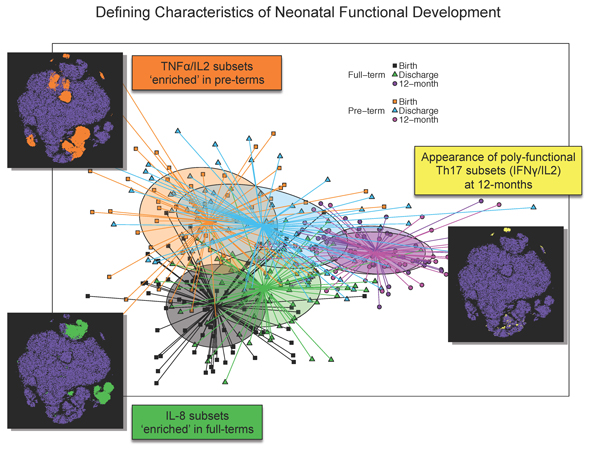Understanding human infant T cell development, immunity, and risk of disease
 Infants are our most precious and vulnerable population. They are at increased risk of severe disease caused by respiratory pathogens that include viruses and bacteria. Their immune systems are both naïve and immature and much less able to control infections. Yet we know very little about human infant immune system development and function during the first weeks and months of life. As our ability to save the lives of babies born prematurely improves, many more infants survive. Their lungs are often underdeveloped and at increased risk of severe disease after infection. Their immune systems are even more underdeveloped than infants born full term. We are studying infant T cell development and function from birth, to discharge from the hospital, to the first year of life, and at 3 years of age. We are finding strong relationships of T cell development and function to gestational age and gender. We have described immune functions that are unique to infant T cells and virtually not present in adults. It is clear that the infant immune system is very different from that of older children as adults and imperative that we learn how this relates to risk of respiratory diseases. Our goals are to identify immune system characteristics that can be measured at or just after birth that predict which children are most at risk of severe outcomes cause by respiratory pathogens. In parallel studies, we are focusing on infants infected with Respiratory Syncytial Virus (RSV). RSV is one of the leading causes of hospitalization due to infection in infants, especially those under 6 months of age. Yet we do not know what factors determine which infants infected with RSV will go on to develop a mild disease or one that requires hospitalization or even care in the neonatal intensive care unit. We are studying immune system function against RSV in infected infants. Our goals are to understand the immune factors and bacterial co-infections that determine the outcome of infection, and to identify biomarkers that can be measured at illness presentation and used to assess their risk of going on to develop severe disease.
Infants are our most precious and vulnerable population. They are at increased risk of severe disease caused by respiratory pathogens that include viruses and bacteria. Their immune systems are both naïve and immature and much less able to control infections. Yet we know very little about human infant immune system development and function during the first weeks and months of life. As our ability to save the lives of babies born prematurely improves, many more infants survive. Their lungs are often underdeveloped and at increased risk of severe disease after infection. Their immune systems are even more underdeveloped than infants born full term. We are studying infant T cell development and function from birth, to discharge from the hospital, to the first year of life, and at 3 years of age. We are finding strong relationships of T cell development and function to gestational age and gender. We have described immune functions that are unique to infant T cells and virtually not present in adults. It is clear that the infant immune system is very different from that of older children as adults and imperative that we learn how this relates to risk of respiratory diseases. Our goals are to identify immune system characteristics that can be measured at or just after birth that predict which children are most at risk of severe outcomes cause by respiratory pathogens. In parallel studies, we are focusing on infants infected with Respiratory Syncytial Virus (RSV). RSV is one of the leading causes of hospitalization due to infection in infants, especially those under 6 months of age. Yet we do not know what factors determine which infants infected with RSV will go on to develop a mild disease or one that requires hospitalization or even care in the neonatal intensive care unit. We are studying immune system function against RSV in infected infants. Our goals are to understand the immune factors and bacterial co-infections that determine the outcome of infection, and to identify biomarkers that can be measured at illness presentation and used to assess their risk of going on to develop severe disease.